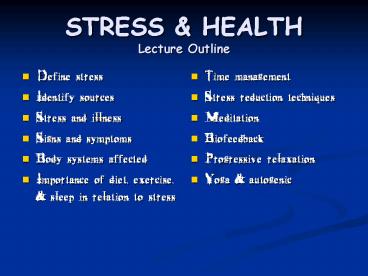STRESS - PowerPoint PPT Presentation
1 / 27
Title:
STRESS
Description:
Importance of diet, exercise, & sleep in relation to stress. Time management ... Build life skills; decision making, communication, stress and conflict management ... – PowerPoint PPT presentation
Number of Views:28
Avg rating:3.0/5.0
Title: STRESS
1
STRESS HEALTHLecture Outline
- Define stress
- Identify sources
- Stress and illness
- Signs and symptoms
- Body systems affected
- Importance of diet, exercise, sleep in relation
to stress
- Time management
- Stress reduction techniques
- Meditation
- Biofeedback
- Progressive relaxation
- Yoga autogenic
2
A Biological Response
- Stress is a biological response to the demands
made - upon an individual
- It is a challenge to the bodies inner balance
3
Stress is the combination of a stressor and our
response to it.
4
Stress is caused by stressors, or demands that
require us to adapt.
5
How the body reacts to stress
- When the body becomes stressed the balance is
disrupted - The body goes through an adaptive response to get
balanced.
6
In the Cardiovascular System
- Increased heart rate
- Damage to blood vessels
- Raises in levels cholesterol
- In the Immune system
- Suppresses the ability to produce and maintain
lymphocytes and killer cells - 2. Impaired interferon levels and organs such as
the thymus
7
HOW DO YOU DEFINE STRESS?
- Any Psychological or Emotional Response
- to any stimulus
- that disturbs
- a persons
- homeostasis or balance
8
Stress Hormones Affect Body
- Alarm..Resistance.Recovery
- This fight or flight response can impair specific
body systems - Less saliva is produced
- Rhythmic contractions of the esophagus are
disrupted - Stomach slows down
- Liver releases glucose
- Pancreas can become chronically inflamed
9
Stressor
Release of Catecholamine's From the adrenal glands
10
CONTINUED
11
CONTINUED
12
(No Transcript)
13
What stresses one person may not stress another
- Stressors can be
- 1. Physical
- 2. Emotional
- 3. Social
- 4. Intellectual
- 5. Spiritual
14
STRESSORSThe physical or psychological event or
condition that produces stress
- What are your stressors?
15
Relationship Between Stress and Health and
Performance
16
(No Transcript)
17
The American Institute of Stress
INTERNAL SENSE OF BALANCE
18
Coping with Stress
- Know your limitations
- Dont try to control every situation
- Respect other cultures
- Visualize a successful response to a situation
- Respect and take care of your body and health
19
Coping with Stress
- Can a person develop a stress resistant
personality? - Build better social support thru meaningful
relationships - Contribute to your family community
- Have high expectations for yourselves
- Build life skills decision making,
communication, stress and conflict management
20
Lets see what happens-with Biofeedback
21
STRESS MANAGEMENTWhat is biofeedback?Biofeedba
ck is a technique in which people are trained to
improve their health by learning to control
certain internal bodily processes that normally
occur involuntarily, such as heart rate blood
pressure, muscle tension, and skin temperature.
School of Biofeedback
22
These activities can be measured with electrodes
and displayed on a monitor that both the
participant and his or her practitioner can see.
The monitor provides feedback to the participant
about the internal workings of his or her body.
This person can then be taught to use this
information to gain control over these
"involuntary" activities. Biofeedback is an
effective therapy for many conditions, but it is
primarily used to treat high blood pressure,
tension headache, migraine headache, chronic
pain, and urinary incontinence.
These activities can be measured with
electrodes and displayed on a monitor that both
the participant and his or her practitioner can
see. The monitor provides feedback to the
participant about the internal workings of his or
her body. This person can then be taught to use
this information to gain control over these
"involuntary" activities. Biofeedback is an
effective therapy for many conditions, but it is
primarily used to treat high blood pressure,
tension headache, migraine headache, chronic
pain, and urinary incontinence.
23
MASSAGE IS HELPFUL
24
Release your Stress
- YOGA
25
The study of Psychoneuroimmunology
- The relationship between stress and disease
- Study of the interactions among the nervous
system, the endocrine system, and the immune
system - Stress through the actions of the nervous and
endocrine systems, impairs the immune system and
thereby affects health
26
PNI
- Increased levels of cortisol are linked to a
decreased number of immune system cells or
lymphocytes. - Scientists believe hormone like substances called
neuropeptides appear to translate stressful
emotions into biochemical events
27
PNI
- Stressors that are acute have no overall effect
on immune function, but chronic stress may have a
negative effect. - Mood, personality, behavior, and immune
functioning are intertwined. - Positivity may enhance immunity































